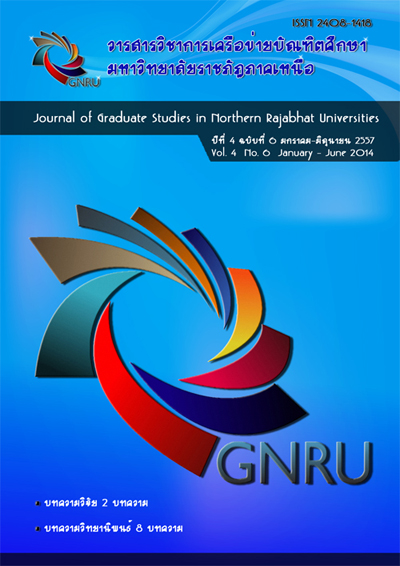ผลการจัดประสบการณ์แบบวิทยาศาสตร์ที่มีต่อความสามารถในการคิดวิเคราะห์ ของเด็กปฐมวัย; The Effect of Scientific Experience Arrangement on Critical Thinking Ability of Early Childhood
Main Article Content
Abstract
บทคัดย่อ
การวิจัยครั้งนี้มีวัตถุประสงค์ดังนี้ 1) เพื่อเปรียบเทียบจานวนของเด็กปฐมวัยที่ได้รับการจัดประสบการณ์แบบวิทยาศาสตร์ มีความสามารถในการคิดวิเคราะห์ผ่านเกณฑ์ร้อยละ 75 ของคะแนนเต็มกับเกณฑ์ร้อยละ 75 และ 2) เปรียบเทียบความสามารถในการคิดวิเคราะห์ของเด็กปฐมวัยก่อนและหลังที่ได้รับการจัดประสบการณ์แบบวิทยาศาสตร์ กลุ่มตัวอย่างในการวิจัยครั้งนี้ ได้แก่ เด็กปฐมวัย อายุ 4-5 ปี ที่กาลังศึกษาอยู่ในชั้นอนุบาลปีที่ 1 ภาคเรียนที่ 2 ปีการศึกษา 2556 ของโรงเรียนบ้านศาลเจ้าไก่ต่อ สานักงานเขตพื้นที่การศึกษาประถมศึกษานครสวรรค์เขต 2 จานวน 1 ห้องเรียน จานวนนักเรียน 24 คน ซึ่งได้มาจากการสุ่มแบบกลุ่ม เครื่องมือที่ใช้ในการวิจัยประกอบด้วย 1) แผนการจัดประสบการณ์แบบวิทยาศาสตร์ซึ่งมีความเหมาะสมในระดับมาก 2) แบบทดสอบวัดความสามารถในการคิดวิเคราะห์ เป็นแบบทดสอบที่มีคาถามเป็นรูปภาพ เป็นแบบเลือกตอบ 3 ตัวเลือก จานวน 30 ข้อ ที่มีค่าความยากง่ายตั้งแต่ 0.50-0.73 และมีค่าดัชนีอานาจการจาแนก (B) ตั้งแต่ 0.20-0.53 และมีค่าความเที่ยงเท่ากับ 0.74 วิเคราะห์ข้อมูลโดยใช้สถิติเครื่องหมาย-อันดับของวิลคอกซัน
ผลการวิจัยพบว่า
1. เด็กปฐมวัยที่ได้รับการจัดประสบการณ์แบบวิทยาศาสตร์มีความสามารถในการคิดวิเคราะห์ ผ่านเกณฑ์ร้อยละ 75 ของคะแนนเต็ม มีจานวน ร้อยละ 87.50 ซึ่งสูงกว่าเกณฑ์ร้อยละ 75 อย่างมีนัยสาคัญทางสถิติที่ระดับ .05
2. เด็กปฐมวัยที่ได้รับการจัดประสบการณ์แบบวิทยาศาสตร์มีความสามารถในการคิดวิเคราะห์หลังการจัดประสบการณ์สูงกว่าก่อนการจัดประสบการณ์อย่างมีนัยสาคัญทางสถิติที่ระดับ .05
Abstract
The purposes of this research were to 1) compare the amount of students by using scientific experiened arrang whose passed 75 percent of full scores, and 2) compare the ability of critically thinking before and after used the scientific experienced arrangement of early childhood children.
The samples used in the study were 24 early childhood children aged 4-5 years old of early childhood Bansanjoukaitor school. The experiment was conducted during the second semester of the 2013 academic year. The research instruments used in this study were 1) activity arrangement with scientific experience learning lesson plan which were the most appropriate and 2) The 30 items with three mulitiple choice of critical thinking ability test had the degree of difficulty between 0.50 - 0.73, the discrimination between 0.20-0.53 and the reliability coefficient of 0.74. The collected data were analyzed by the Wilcoxon Signed-Rank test. The research findings were as follows:
1. Early childhood children receiving an activity arrangement with Scientific Experience has been the critically thinking to passed with 75 percent of the total of 87.50 percent. Which is higher than 75 percent with significantly at the .05 level.
2. Early childhood experiencing an activity arrangement with Scientific Experience had higher critical thinking ability after learning than that before learning significantly at the .05 level. .


